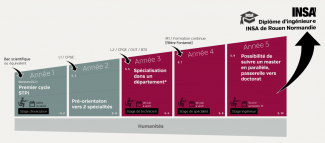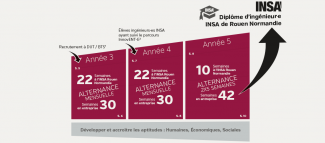Engineering specializations
- Diplôme national d’Ingénieur (national engineering degree) is a diploma recognized by the French government and accredited by the Commission des Titres d'Ingénieur (CTI), which guarantees the conformity of the training with a reference system. This diploma confers the degree of master.
- All INSA Rouen engineering degrees have the EUR-ACE® quality label
A broad range of business-oriented engineering curriculums
INSA Rouen Normandie welcomes nearly 2,000 students. It is the largest public engineering school in Normandy. It embodies the INSA Group's openness and human values. Its programs mainly focus on international, business-oriented and cross-disciplinary courses, as well as on a wide range of cultural and sports activities.
Student engagement in associations is encouraged and valued throughout the school year. In addition, as an international school, nearly a forth of INSA Rouen students come from abroad to enroll in entire training cycles as well as in exchange semesters with tailored programs: Summer School, Bilingual Program, English courses.
Engineering curriculum under student status
- A progressive specialization
At the end of the first three semesters of the common core, whether in standard or bilingual programs, students choose two out of seven specializations under student status and three under apprenticeship status. The final specialization choice is made at the end of the second year.
The last six specialization semesters lead to an INSA Rouen Normandie Engineering degree, accredited by the French Commission des titres d'ingénieur (CTI), and equivalent to a master's degree.
Throughout the 5-year period, more than 20% of education is devoted to languages, communications, management, finance, and to physical and cultural activities. During their fifth year, students can personalize their curriculum according to their personal project by selecting various options, some of which are available across specializations. In addition, fifth-year students can also enroll in INSA's research-oriented master’s courses, or take advantage of the several exchange agreements and dual degrees with French and international academic partners, or even get involved in an entrepreneurial-oriented project.
Obtaining an INSA Rouen Normandie Engineering degree depends on validating 300 ECTS acquired throughout the curriculum, reaching a CEFRL (Common European Framework of References for Languages) B2 level in English (in French for international students), and on completing a student internship or an exchange program with an academic partner.
Throughout the curriculum, students complete several internships at companies or laboratories:
- A one-month internship between the first and second year
- A three to four-month internship at the end of the third or fourth year
- A five to six-month final internship
Engineering curriculums under apprenticeship status
To meet company requirements, INSA Rouen Normandie offers engineering training through apprenticeships in three fields:
- Energy Performance
- Industrial Performance and Innovation
- Innovation Performance and Security Processes
These three programs focus on innovation and include a core of technical and scientific-based courses. They combine a monthly work-study program over the first two-years (third and fourth years) and a tailored work-study time period during the final year. These courses provide salaried work and the opportunity to acquire valuable professional experience through regular immersion in the business world. It is a three-year course, except for students who have completed the InnovENT-E program.
A training environment
Academic and Research Departments
The courses are designed by 7 specialization departments and the Science and Technology for Engineers Department. They receive support by the Humanities Department, in charge of languages, communications, finance and management courses, and physical and cultural activities. The departments provide cutting-edge equipment (practical training and IT rooms, semi-industrial educational platforms).
Research-oriented training
All the programs are backed by one or several research laboratories. Throughout their undergraduate years, students work in laboratories with research professors. Such collaboration enables students to explore future technologies and develop innovative skills. Students can complete a master's degree during their fifth year and optionally pursue their academic training through a specialized master's degree or a doctorate.
Strong relationships with companies
Partner companies greatly assist students in becoming professionals. Students are regularly assessed on career development and on the relevance between our degrees and their personal needs. Companies also engage in student-focused educational content.


